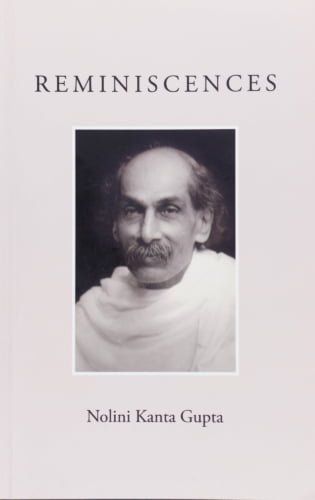Reminiscences by Nolini Kanta Gupta

Reminiscences
In these reminiscences, Nolini Kanta Gupta recounts the highlights of his eventful life — his transition from student to revolutionary to a disciple of Sri Aurobindo and the Mother. The memoirs first appeared in English translation in 1969 under the title Reminiscences.
Book Details
Author: Nolini Kanta Gupta
Print Length: 198 pages
Publisher: Sri Aurobindo Ashram
Book format: PDF, ePub, Kindle
Language: English
Book Download
Contents
- The Ullas — Russell Encounter 1
- Muraripukur 1
- Muraripukur 2
- Deoghar
- Shyampukur
- Pondicherry 1
- Pondicherry 2
- Pondicherry Cyclone
- Two Great Wars
- I Bow to the Mother
- I Played Football
- The Soviet Gymnasts
- My Athletics
- Eternal Youth
- The Second World War (1939-1945)
- The Situation of Today
Book Sample
Reminiscences by Nolini Kanta Gupta
The Second World War
This is a war to which even spiritual seekers can hardly remain indifferent with impunity. There are spiritual paths, however, that ask us to render unto God what is God’s and unto Satan what belongs to Satan; in other words, spirituality is kept apart from what is called worldliness, clean and untouched by the dust and murk of Ignorance — Maya. The injunction accordingly is that they who are worldly must remain worldly, they have no business, no right to meddle with spirituality; and they who are spiritual, on the other hand, should remain strictly spiritual, should have nothing to do with worldliness. Because of this complete divorce between the spiritual and the worldly, the world remains worldly even today, and continues to be the empire of unspirituality and obscurity, of suffering and grief; it is unable to become a dynamic and living expression and embodiment of the Spirit.
Not that spiritual men have not served and worked for the welfare of the world; but their work could not be wholly effective, it was mixed, maimed, temporary in effect. This could not be otherwise, for their activity proceeded from inferior and feebler sources of inspiration and consciousness other than those that are purely spiritual. Firstly, little more was possible for them than to exercise an indirect influence; their spiritual realisation could bring into the life of the world only a reminiscence, an echo, just a touch or a ray from another world. Or, secondly, when they did take part in worldly affairs, their activity could not rise much beyond the worldly standard; it remained enclosed within the sphere of the moral and the conventional, it took such forms as charity and service and philanthropy. Nothing higher than ideas and ideals confined to the moral, that is to say, the mental plane, could be brought into play in the world and its practical life — even, the moral and mental idea itself has often been mistaken for true spirituality. Thus the very ideal of governing or moulding our worldly preoccupations according to a truly spiritual, a supramental or transcendental consciousness, was a rare phenomenon and even where the ideal was found, it is doubtful whether the right means and methods were discovered. Yet the sole secret of changing man’s destiny and transmuting the world lies in the discovery and application of a supreme spiritual Conscious-Power.
…
